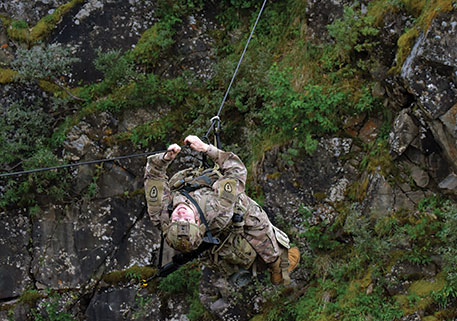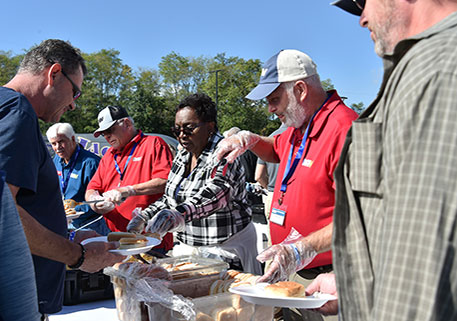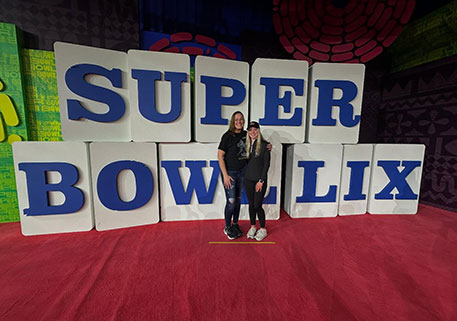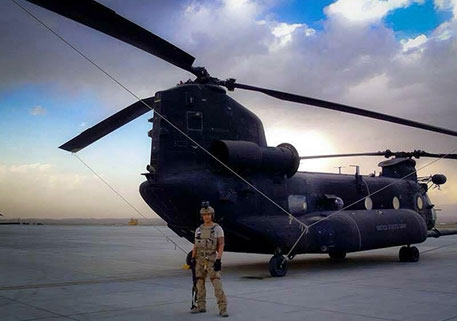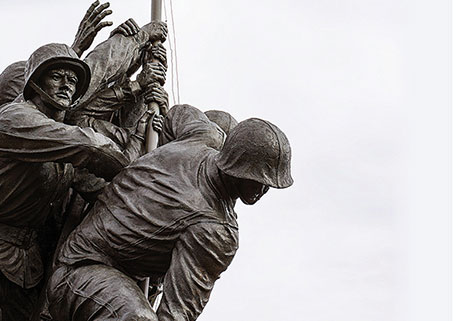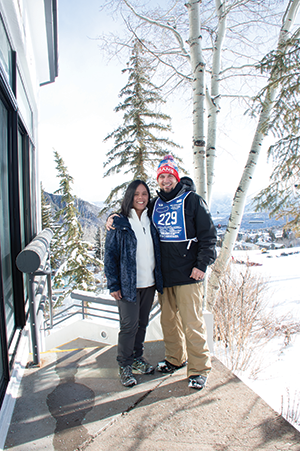
Ask Adam Greathouse what saved his life, and he’ll tell you it was attending the National Disabled Veterans Winter Sports Clinic for the first time in 2012.
A bacterial infection in his lungs almost killed him during a deployment to Kosovo in 2001. He went into acute respiratory distress, which led to a traumatic brain injury from lack of oxygen.
After coming out of a two-month coma, he had uncontrollable, involuntary twitches and a hard time remembering things. He had lost nearly 100 pounds. A far cry, he said, from the 10-foot-tall, bulletproof, 3rd Infantry Division soldier he saw himself as before.
“I felt embarrassed,” said Greathouse, a DAV member of West Virginia Chapter 2. “That’s why I stayed in my room and just self-medicated.”
Because of his injuries, he said he felt toxic, like he was a failure and a burden to others. He reluctantly went to the clinic but had plans to take his own life when he got back home.
But after attending, things changed.
“I found my purpose through my injury with my post-growth,” he said.
For 38 years, the winter sports clinic, which is co-presented annually by DAV and the Department of Veterans Affairs, has catapulted thousands of other severely injured veterans like Greathouse away from their daily routines and into a community of adaptive sports.
Nearly 400 participants—126 for the first time—went to Snowmass, Colorado, April 1–7 for this year’s event.
On the surface, the winter sports clinic may seem like pure recreation—Alpine skiing, Nordic skiing, rock climbing, biking, scuba diving, fly-fishing, sled hockey, snowmobiling and curling—with activities serving as a distraction from the reality of life with a disability. But for those who have experienced adaptive sports at this clinic over the years, it’s much more. It’s designed to be a therapeutic gateway where participants can find purpose, community and healing unlike anything else they’ve done after illness or injury.
Dr. Melissa Tinney, a physical medicine and rehabilitation doctor at the VA medical center in Ann Arbor, Michigan, was a first-time volunteer with the clinic’s medical team but has been a proponent of adaptive sports as part of a veteran’s rehabilitation plan since she began her career in 2006. She said becoming severely ill or injured can be a devastating experience for veterans who were previously in their peak physical condition.
“I think that’s where adaptive sports really come in, is that sense of physical accomplishment which translates into much, much more for the person,” Tinney said.
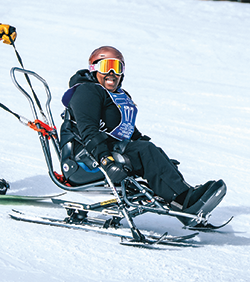
Army veteran Tiffaney Davison said the winter sports clinic gave her a new beginning after a military training accident in 2001 left her paralyzed. She uses a wheelchair and thought her life would be confined there until she learned about adaptive sports.
She skis by sitting on a bi-ski. A volunteer holds onto tethers attached to the ski’s seat to help Davison control her speed and direction on the mountain.
“I feel like I got a superpower,” Davison said. “When I do tell people what my experiences are, they’re blown away. They can’t believe it until they start seeing pictures.”
The winter sports clinic took a team of more than 600 volunteers, and facilitators experiences were tailored to each veteran’s specific needs. Disabilities included limb loss, blindness, paralysis and severe traumatic brain injury. But through equipment modifications and volunteer assistance, everyone could participate in any activity they desired.
“We’re able to do it at all levels, not just elite athletes,” Tinney said. “It’s everybody meeting them where they’re at. That’s what’s amazing about this event in particular and what the VA does with adaptive sports.”
This was Army veteran Erik Castillo’s second winter sports clinic. He sustained a traumatic brain injury and left-side paralysis in 2004 when shrapnel from an explosion near his Humvee in Iraq tore through the right side of his head.
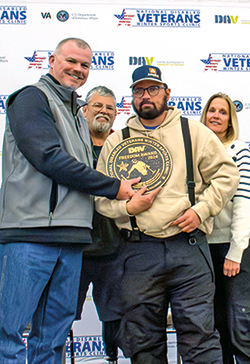
Doctors thought he’d be confined to a hospital bed for the rest of his life and would never walk again. But, after 22 surgeries and years of rehabilitation, Castillo not only walks but also skis, curls and participates in other recreational activities after learning about the VA’s adaptive sports programs last year.
“It was kind of life-changing, because it gives you a brand-new outlook on life of what you can do,” Castillo said.
Today, he works at the VA medical center in Tucson, Arizona, as a peer support specialist and encourages other veterans toward adaptive sports.
“Your whole outlook on life changes,” said Castillo. “I think these clinics are actually very powerful.”
Because of his perseverance, courage and determination, Castillo was recognized as the clinic’s 2024 DAV Freedom Award recipient.
“Erik represents everything this clinic is about,” said DAV National Voluntary Services Director John Kleindienst. “Hearing his story about all he’s had to overcome and then seeing him out on the mountain skiing drives all of us who work to put the winter sports clinic together to make it better year after year.”
Beyond the therapeutic benefits of sports and activities, another healing aspect of the clinic is found through the community and bonds formed by the common experience of service and having to face the life-altering daily challenges of disability.
“This is such an incredibly powerful event, having this many veterans in one place,” Tinney said. “The camaraderie you build. The relationships you build. Then the energy that people get from this experience, they take home and then continue that.”
Army veteran Susan Baldwin, a first-time participant, said she saw it from the moment she arrived at the clinic.
“You could see every vet connecting and not having to have any introductions. That’s what we do,” she said.
Baldwin, who had to have both her legs amputated 14 months before the clinic, said it reminds her of the bonds she felt when she was in the service. Meeting other veterans who were further down their recovery journey was inspiring and gave her a boost to keep pushing herself.
“I found a whole village,” Greathouse said about his 2012 clinic experience. He’s been back nearly every year since as part of his recreation and mental health therapies.
Greathouse, who received the DAV Freedom Award in 2017 and is the commander for the DAV Department of West Virginia, is now a regular volunteer at his VA medical center in Huntington, West Virginia, and uses his experiences to encourage other veterans who may be struggling to find hope.
This year’s clinic was especially memorable for him because of an unexpected reunion with the doctor who convinced him to go to the winter sports clinic in 2012.
Tinney was the chief of physical medicine and rehabilitation in Huntington and was the lead for the team that helped Greathouse down his path toward recovery starting in 2011. They hadn’t seen each other in six years, after she transferred from Huntington to the VA in Ann Arbor in 2018.
Neither knew the other was going to be at this year’s clinic.
Their reunion was emotional as they filled each other in on what had happened since their last meeting.
“I’m incredibly proud of you,” Tinney said to Greathouse. “As a physician, sometimes you don’t get to see what happens after. Because, really, if I’d done my job, people are on their way and don’t have to see me again.”
It wasn’t a smooth process, though. Early on, Greathouse often avoided scheduling appointments and was always late, but Tinney refused to give up on him, encouraging her team to keep pressing.
“Just keep calling. And keep calling,” Tinney said. “But you answered. And you scheduled. Eventually.”
Over time, Greathouse said her persistence developed into trust. That trust led him to healing. The healing led to him helping others, and he credits Tinney for laying that foundation.
“Heroes save lives, and you saved mine,” Greathouse told her. “Every single veteran I’ve helped … you’ve been a huge part of that. So even when you’re not boots on the ground, you’re around.”
Likewise, she says his progress influences the adaptive sports training she gives younger doctors.
“What grew from us now keeps growing,” she told him.

